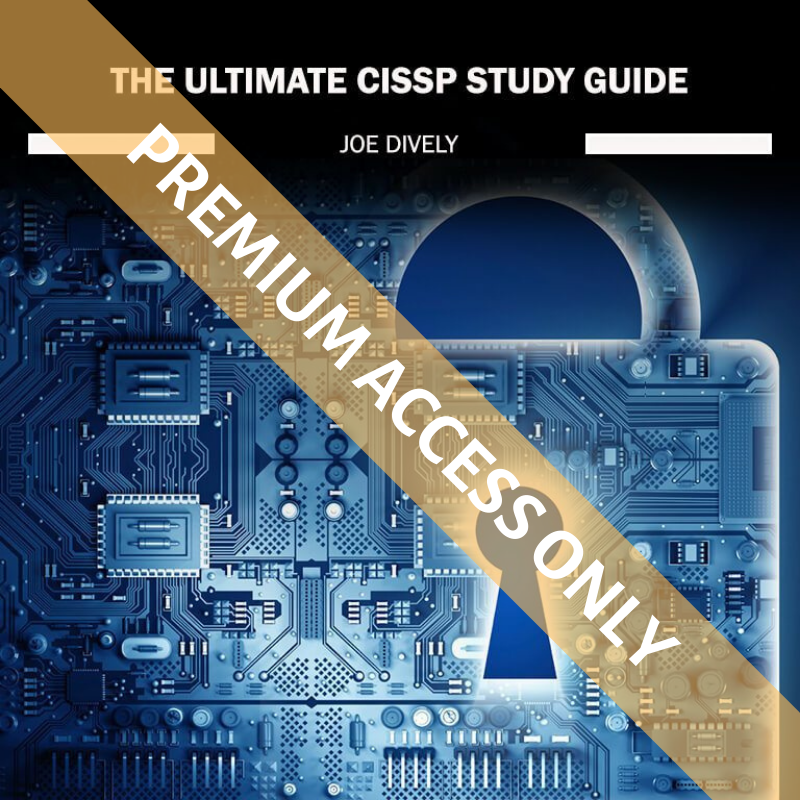No products in the cart.
The access to this course is restricted to eForensics Premium or IT Pack Premium Subscription
18 CPE credits
COURSE IS SELF-PACED
This course is designed to first test your knowledge in all 8 domains of the CISSP exam so you know your weak points and can put more study time into those areas. It will give an overview of the MUST-know information for your CISSP exam. It also will give you study tips, how to trigger answers from memories from a psychological standpoint, and teach you study habits’ conducive to learning. The course will also contain an overview of each section of the exam. There will be recommended readings and a weekly quiz along with homework. This is not a boot camp type course but should be used as a MUST-KNOW guide before you take the exam. It will also show you how to reason out answers where you have no previous hands-on experience with that particular topic.
It can also be used as a reminder for the person with a degree in cyber security/security risk management or 5 or more years working in the field to allow them to more easily remember the concepts they learned in school or in the field. There will also be a final exam to allow you to know where you stand at the end of the course and compare that to your score at the very beginning of the course to see how well you have learned the material.
This is a graded course. Included in the grading will be your homework, all tests, and quizzes along with your homework and final exam grade. Only the initial: ”where do I stand at the beginning of the course test will NOT be counted you’re your final grade. If you are maintaining a 93% score at the time of the final you will be exempt from it and receive a score of whatever your average is or you can opt to take the test to see if you can increase your grade. However, if you do take it and for some reason get a lower grade that lower grade will be the grade averaged to your existing average. You must get a 70% or better to pass.
IMPORTANT NOTE: This course was published in January 2016. It is based on the old version of the CISSP exam and curriculum (valid before the April 2018 update). It can still be used as a guide for self-study through the CISSP domains, but it does not include textbook-style information packages, in favor of giving you a structure to learn with.
What will you learn?
- How to prepare for the CISSP exam
- What to expect when you take the CISSP exam
- Analysis of the CISSP style questions
- What to do when you see an unanswerable question
- How not to get discouraged during the exam
- The CISSP vocabulary
- General overview of the 8 domains that will be tested
What skills will you gain?
- An understanding of what to expect on exam day
- Knowledge of the exam and the answers and what is expected
- The ability to speak and understand the basics of all the CISSP domains
- Students will know where they are weak and be able to study those areas
What will students need?
- Pen/Pencil and Lined Paper for homework. PC or tablet of some type with web access and some sort of word processing software along with access to a scanner for homework.
What should you know before you join?
A good understanding of PC’s, networks, and the key principles of information security.
Take the placement test for this course:
Click here: LINK!
YOUR INSTRUCTOR:
JOSEPH DIVELY, CISSP
 One of my top assets to any company is a current degree with knowledge of cutting edge technology along with more than twenty years experience in computer systems design, security, installations, maintenance and troubleshooting. My technical knowledge encompasses multiple manufactures equipment and disciplines of information technology, I have exceptional communication skills, am able to actively make assessments of customer needs and specifications and identify issues along with cost effective solutions.
One of my top assets to any company is a current degree with knowledge of cutting edge technology along with more than twenty years experience in computer systems design, security, installations, maintenance and troubleshooting. My technical knowledge encompasses multiple manufactures equipment and disciplines of information technology, I have exceptional communication skills, am able to actively make assessments of customer needs and specifications and identify issues along with cost effective solutions.
- I have extensive project management experience and can come in under budget.
- BS in Information Science and Technology - Security Risk Management Cyber Security Concentration with a minor in Sociology from Penn State University (May 1014)
- CISSP certification from (ISC)2.
- NSTISSI-4011 Certificate for Information Security Professionals by CNSS and NSA from PSU
- Knowledgeable on advanced networking and databases from a design, security, and usability standpoint
- Experienced with artificial neural networks using both learning and feature based systems
- Systems integration experience including network and security architecture, systems administration and project management.
Technology profile:
- DOS, Windows , Windows 95, Windows 98, Windows Millennium, XP, Vista, Windows 7, Windows 8, Linux (Free BSD, Red Hat, and Ubunto), Cobalt (Sun flavor of linux based on DOS, Windows , Windows 95, Windows 98, Windows Millennium, XP, Vista, Windows 7, Windows 8, Linux (Free BSD, Red Hat, and Ubunto), Cobalt (Sun flavor of linux based on redhat)),
- My Linux experience started in 1983 with Free BSD that I used to set up an ISP operation. I moved to RedHat in the 90s and more recently have been using Ubuntu.
- Windows Server 2008/2012, experience working with various hubs, routers, switches, and other hardware from vendors such as Cisco, both wired and wireless networks.
- Well versed with both wavelength division multiplexing (WDM, CWDM, DWDM).
- Experience with TCP/IP, Routing Information Protocol.
- Cyber Security is my main area of study so I have worked with IPSEC and various encryption and authentication schemes, along with SSH and TLS. I am also familiar with IGMP Snooping. I am familiar with both internal and external border gateway control protocols.
Design skills:
- Design experience with network architecture for large scale integration along with security, all hardware and software including custom applications. Extensive experience with routers, hubs, switches, and firewalls including intrusion prevention and detection applications, complete integration between database servers, ecommerce systems, work flow and accounting systems.
Databases:
- Most RDBMS including: NoSQL, Oracle, mySQL, and Microsoft SQL Server 2008, limited experience withOracle.
Software and programming languages:
- Microsoft Office, MS Office 355, C, Visual Basic, Java, perl, PHP, html (Various Levels) XML, RSS generation, MiniTab Statistical Software, WordPress, and Joomua along with various content management systems.
Security and forensics systems:
- Encase, FTK, Wireshark, COFEE, The Slueth Kit, DECAF, Snort;
Syllabus
Module 1
Introduction and Overview
Module 1 covered topics:
- Introduction
- Course Overview
- Vocabulary Part 1
- Test Taking Strategies
- Security and Risk Management
- Asset Security
Module 1 exercises:
- Self Test
- Homework
- Index Cards Part 1
- Quiz on covered topics
Module 2
Security Engineering, Communication, and Network Security
Module 2 covered topics:
- Overview of each domain
- Vocabulary Part 2
- The Basis of all information Security
- Security Engineering topics
- Communication & Network Security topics
Module 2 exercises:
- Homework
- Index Cards Part 2
- Quiz on covered topics
Module 3
Identity & Access Management – Security Assessment and Testing
Module 3 covered topics:
- Overview of each domain
- Vocabulary Part 3
- Identity & Access Management topics
- Security Assessment and Testing topics
Module 3 exercises:
- Homework
- Index Cards Part 3
- Quiz on covered topics
Module 4
Security Operations & Software Development Security
Module 4 covered topics:
- Overview of each domain
- Vocabulary Part 4
- Identity & Access Management topics
- Security Assessment and Testing topics
Module 4 exercises:
- Homework
- Index Cards Part 4
- Quiz on covered topics
- Final Exam
Contact:
If you have any questions, please contact us at [email protected].

Great
A+++ best course ever!